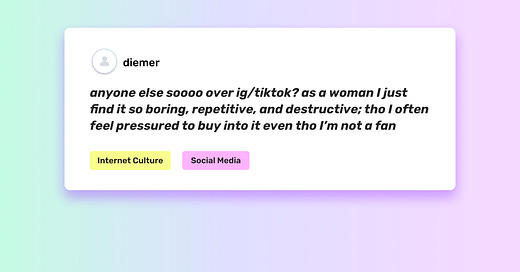Why is it so hard to be a woman online?
A guest essay from...a Diemer!
Today’s newsletter is from Phoebe Lummis, a Diemer whose question about social media ended up inspiring a newsletter-worthy discussion.
But first, here’s what else people are talking about on Diem:
I posted a Diem some time ago on my exhaustion with social media, highlighting how platforms such as Instagram and TikTok slowly deplete my mental power, all the while keeping me in a state of longing for an intangible more. While, personally, I’ve opted to lead most of my life offline — I quit Instagram and TikTok last October — I thought I’d share a bit more about why. So, let’s talk about it.
The female image has been used for millennia, often by men, as a subject of cultural and academic preoccupation. In ancient times (think 30,000 BC), women’s portrayal was closely tied to sociologically salient ideals of fertility and procreation. As time passed, usage of the female image transformed alongside the cultural standards of the era, usually to reiterate dominant norms and gender roles, but occasionally to protest against them. A notable advantage of today’s social media landscape is that women now independently claim, market, and monetize their own images on a massive scale. Hierarchical institutions no longer have exclusive rights to sharing the female image. As a result, social media has evolved into a lucrative space with women at the helm.
Reportedly 77% of content creators and influencers are women, demonstrating women’s drive to leverage social media platforms for financial means, and as an alternative to traditional workspaces. As the influencer economy continues to grow into a half-trillion dollar industry, the idea of earning income by sharing one's life online, free from traditional employment constraints offers a compelling alternative for women who are expected to be mothers, wives, friends, and social-emotional confidants on top of wage-earners.
Yet, the influencer route has its own complications. As Katherina Hu expressed in her work for The Atlantic, “Seeing the rise of successful influencers (or even your high-school friend who decided to start regularly posting on TikTok), you might be easily convinced that if you keep posting videos, follow other creators, and engage with your viewers, you, too, could pull in $20,000 for a single Instagram post. But the dream is deceptive.”
She goes on to explain that while the path may be filled with allure and flexibility, this career path also pulls women out of the traditional workforce and into a riskier professional landscape, where the path to success is clouded by algorithmic variability, prioritizes consumer-safe content over creativity, and lacks traditional employment protections. Not to mention that any livelihood centered around monetizing one’s appearance and personal details risks exposing individuals to privacy and harassment concerns. How many influencers openly discuss their stalkers, home break ins, etc?
Performing a cost-benefit analysis on the feminism of influencing is… exhausting. Likewise, as a female consumer, it’s also exhausting. In my experience, there’s overwhelming fatigue and skepticism accompanying the unconscious ingestion of thousands of covert advertisements by seemingly ‘relatable’ women. I’m no longer envying a distant supermodel selling me a product. I’m looking at one of my friends thinking, ‘Why don’t I look like that?’ or ‘Why don’t I have _?’ I am truly terrified by social media’s power to corrode my real friendships by infusing them with jealousy and unreasonable comparison.
I know I’m not alone in this experience. Offline, my friends and acquaintances frequently confide that their personal, professional, and creative lives flourish when they’ve taken breaks or deleted social media. These stories are not isolated, and I encountered a similar sentiment in Diem. Messages from fellow users include: "It was the best thing ever”, “my brain is so much better off it”, and “I seldom miss them.”
This sense of relief and mental clarity is supported by science, too. In the past five to ten years, countless studies have linked social media to rising mental health disfunction, including anxiety, depression, and suicidal ideation. Women are disproportionately affected. In one example, researchers saw a correlation between Instagram use in women and increased depressive symptoms, lowered self-esteem, and devolving body satisfaction. The same influencers who bought into these platforms simultaneously speak out about their toxicity, and oftentimes encourage their followers to limit their engagement if possible.
Despite all the evidence of social media’s negative effects, I recognize the need, and absolutely still feel pressure, to remain virtually connected. Online socialization has taken over as ‘a new normal.’ I’m not sure I’ll be back on Instagram or TikTok anytime soon, but I am psyched to be part of next-gen networking platforms like Diem using tech for authentic community-building and constructive communication.
How do you feel about social media? Are you exhausted too? Would love your thoughts in Diem.
ICYMI
Boob Grabbing and Girlypops
Welcome to The Briefing, a roundup of the best of girl internet (AKA Diem) this week. You’re receiving this because you’re subscribed to The Things We Don’t Talk About. If you’d like to opt-out of The Briefing, head here. Forwarded this email? Subscribe now for the best of Diem every Tuesday and Friday.
Before you go…
The latest version of Diem is now available — update on iOS, web, and Android!





